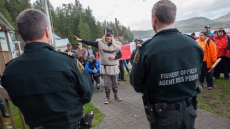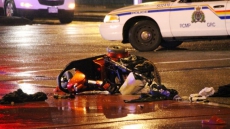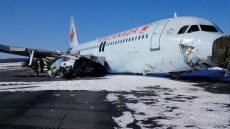OTTAWA — The House of Commons is expected to vote tonight on the Conservative government's proposal to extend its military campaign in Iraq for up to one year and authorize airstrikes in Syria.
Up to 69 special forces advisers will also remain in the region to advise and assist Kurdish peshmerga forces in their efforts to beat back the advance of militants from the Islamic State of Iraq and the Levant.
Debate on the motion began last Thursday and continues today. Here is a look at some of the themes of the debate so far:
On national security:
The Conservatives partially framed the need for military strikes against ISIL targets as necessary to protect Canadians, given the potential for ISIL ideology to radicalize people in this country.
"Saying that Canada should only have a humanitarian aid role in the international effort to contain ISIL is akin to saying that it is not in our nation's interest to prevent assault before it happens, rather to stand by and watch it occur and be satisfied in providing food, shelter and victim support services only after the crime has been committed," said Conservative MP Michelle Rempel.
Some New Democrats maintain there's no proof that ISIL is in fact a domestic threat.
All the threats to Canada have come via the Internet, said the NDP's Alex Atamenko.
"If that is the case, do we realistically believe that these messages will stop as we continue to bomb the hell out of this region?" he asked.
"I submit that they will increase, and ISIL will recruit more deranged individuals to its cause."
On expanding the mission into Syria:
When the government first signed on to the U.S.-led coalition to defeat ISIL, it ruled out airstrikes in Syria on the grounds that it would first need the explicit consent of that country's government and its leader, Bashar Assad.
The Conservatives have changed their thinking on that proposition.
"We have seen, as ISIL has been degraded within Iraq, that they have been moving heavy equipment and personnel into Syria, and they cannot or should not be given a free ride just because we disagree with the government in Syria," said Foreign Affairs Minister Rob Nicholson.
Green party Leader Elizabeth May argued there are clear consequences of that choice.
"We do not want to admit that if we are successful in Syria, we will have made Bashar al-Assad secure by removing a dreadful force that also happens to be against him, she said."
On ISIL's brutality:
Human rights groups and the United Nations have accused ISIL of carrying out war crimes and human rights violations and talk of those crimes found its way into the debate.
The Conservatives argue airstrikes are necessary to prevent everything from the sexual slavery of children to mass murder. Tory MP Cathy McLeod referred to ISIL as a "genocidal death cult" — a line also popular with Defence Minister Jason Kenney — while her colleague Kellie Leitch said they represent "all that is evil in the world."
Conservative MP Mark Astral said ISIL "wears its heinous crimes as badges of honour and broadcasts its barbarism widely in order to try to win depraved individuals over to its jihadist terrorist cause."
But bombing militants is not the solution, New Democrats argue.
"We need to support the development of social infrastructure, supporting the communities themselves, and that means addressing the structural inequalities underpinning the violence in order to eliminate the possibility of more extremism arising," said NDP MP Mylene Freeman.
On humanitarian support:
The Conservatives say they do not view the solutions to the conflict in military terms alone, but insist that security must come first.
"The military components allow for the aid to flow to more areas and allow for more accountability and security," said Conservative associate defence minister Julian Fantino, who used to be in charge of Canada's aid portfolio.
"That, of course, is what aid workers need. We cannot help these people in need with this threat looming over their heads."
The opposition, however, say it is humanitarian support that must be prioritized.
"We must do more to help vulnerable refugee families, because it is a Canadian value, and so that these families' soldiers can confidently fight ISIL," said Liberal defence critic Joyce Murray.





